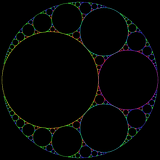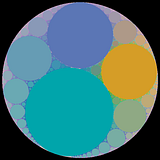> Nor Apollonius
Which one is being referred to? Apollonius of Tyana or Apollonius ot Perga? and why?
> Clouds are never spheres, Nor mountains cones, nor Ponderosa pines
They’re not fractals either, but fractals gives a better approximation. The “mountains never cones” is what inspired Mandelbrot to invent fractals in the first place.
> But rather of an altogether different. Level of complexity
The definition of complexity is a tricky one, but one accepted definition is that something geometrically simple can be described by a small number of mathematical symbols. In that context, fractals are really extremely simple, so ar pseudo-random numbers, but they look complicated.
> The number of the scales of distances Describing her is almost infinite.
We’ve had debates on the forum about “almost infinite”. When it comes to how well fractals describe nature, the number of scales actually present seldom exceeds 5.
> How shall we study the morphology of the amorphous?
Nice poetry.
> A lineage of shapes fretted by chance, whose regularities are all statistical
No, that’s exactly what fractals isn’t.
> Some fractal sets are curves (space-filling curves!) or complex surfaces; others are wholly disconnected ‘dusts’; others are just too odd to have a name.
Yes.
To be admired power to interpret nature’s coiffure of molecules and mountains.
Not molecules, fractals fails miserably to interpret nature in the quantum domain.
> What gentle revolution of ideas disjoins the nineteenth century from ours! Cantor, Peano, Mandelbrot
That’s right. Along with catastrophe theory and a mathematics of computing, fractals are one of the very few new branches of mathematics invented in the 20th century. Of course, the poem is wrong in that we live in the 21st century.
> The masters of infinity, Cantor, Peano, Hausdorff, and Lebesgue
That’s the popular view. For a correct view, see my monographs on infinite numbers. The real masters include Aristotle, De-Bois Reymond, Hahn, Robinson and Conway.
> Spinoza’s darling Cause.
Huh? “Spinoza begins by noting that he has stated various truths about God in Book I”.
> Imagination shoots the breeze with Nature
Poetry needs improvement. Why would one ever want to shoot a breeze?

